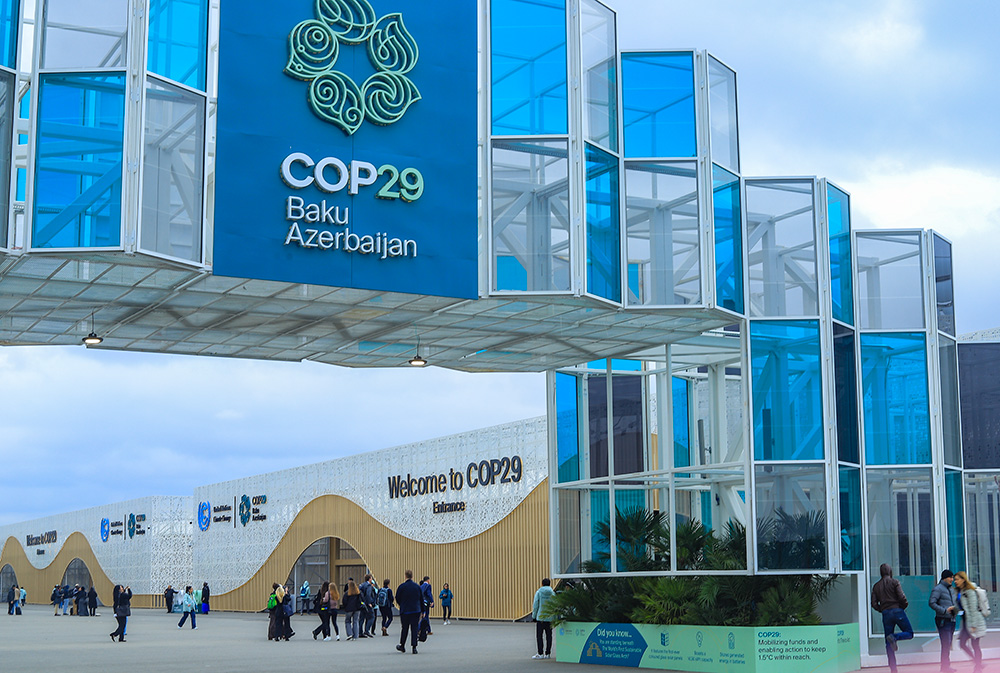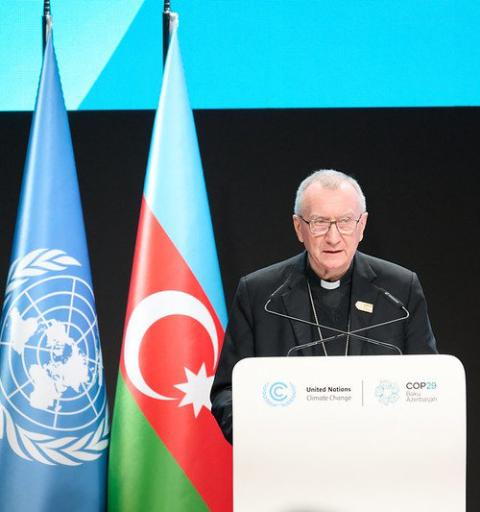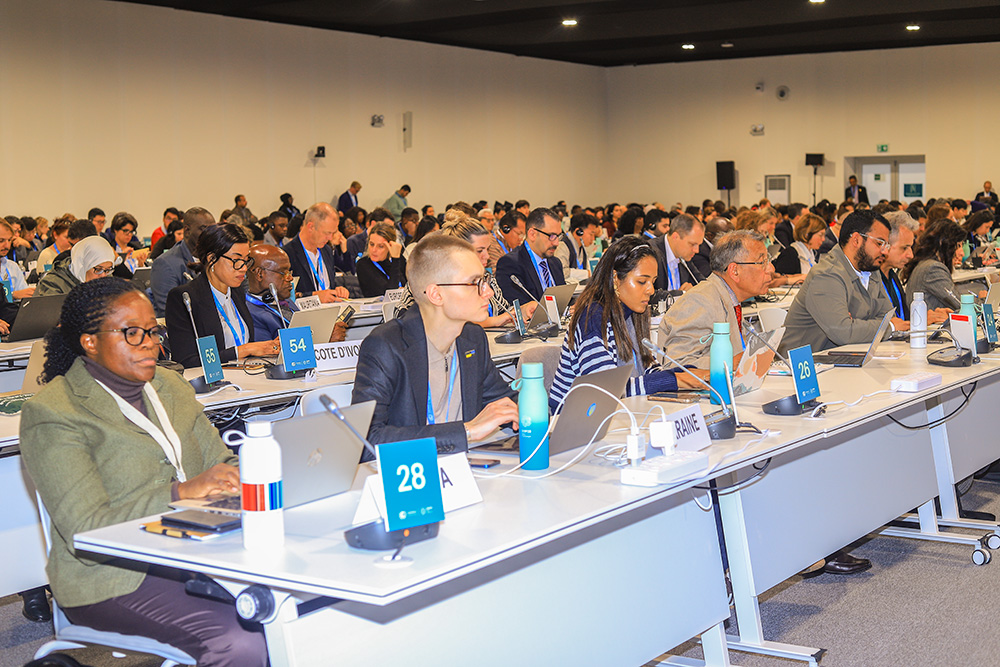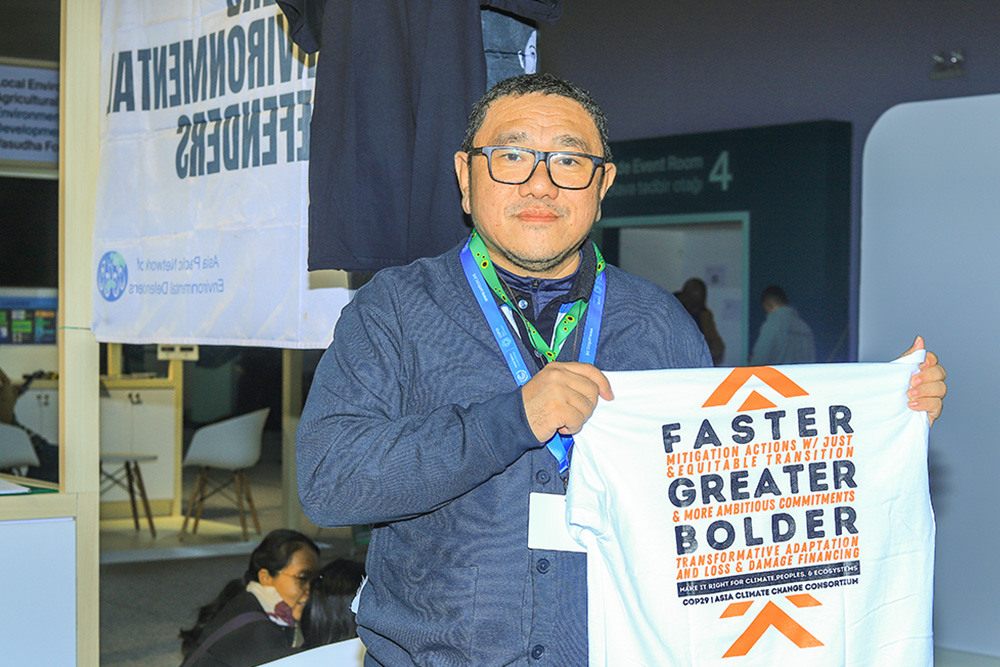
The main gate of the United Nations climate change conference, COP29, in Baku, Azerbaijan. Catholic officials have expressed hope for change in climate solutions after Cardinal Pietro Parolin read Pope Francis' message to other heads of state. (NCR photo/Doreen Ajiambo)
Editor's note: This story was updated at 11:55 p.m., Baku time.
With financing the major focus here at the United Nations climate change conference, Cardinal Pietro Parolin delivered directly to world leaders Pope Francis' appeal that wealthy nations use the upcoming 2025 Jubilee Year to forgive debts "as a matter of justice."
Parolin, Vatican secretary of state, made the comments on behalf of the pope Nov. 13 during the second and final day of the World Leaders Climate Action Summit at the COP29 climate conference. Head of the nine-person Holy See delegation, Parolin emphasized that increasing financial assistance for developing nations to combat the effects of climate change is a crucial priority for the pope.
A central focus at COP29 is establishing a new target for climate financing from developed nations to developing ones to replace the $100 billion annual goal set 15 years ago and reached in 2022. As much as $500 billion to $1 trillion annually could be required to fully fund climate actions at scale, according to a review by the World Resources Institute. Developing nations alongside climate activists have called for financing to come in the form of grants, rather than loans that further deepen debts.

Cardinal Pietro Parolin, Vatican secretary of state, addresses the COP29 World Leaders Climate Action Summit Nov. 13 in Baku, Azerbaijan. (CNS/Courtesy of UN Climate Change)
"Efforts should be made, in particular, to find solutions that do not further undermine the development and adaptive capacity of many countries that are already burdened with crippling economic debt," Parolin said. "Indeed, ecological debt and foreign debt are two sides of the same coin, mortgaging the future."
Parolin then repeated a request Francis made in May ahead of the Catholic Church's 2025 Jubilee Year "directed to the more affluent nations ... that they acknowledge the gravity of so many of their past decisions and determine to forgive the debts of countries that will never be able to repay them. More than a question of generosity, this is a matter of justice."
He cited Francis' critique of "a true ecological debt" existing particularly between the global North and South that's "connected to commercial imbalances with effects on the environment and the disproportionate use of natural resources by certain countries over long periods of time."
In the speech's prepared marks, Parolin said that on climate change "The scientific data available to us do not allow any further delay and make it clear that the preservation of creation is one of the most urgent issues of our time," one closely interrelated to the preservation of peace.
He also lamented that "economic development has not reduced inequality. On the contrary, it has favored the prioritization of profit and special interests at the expense of the protection of the weakest, and has contributed to the progressive worsening of environmental problems."
Parolin in his speech added it is essential that a new international financial architecture be "human-centered, bold, creative and based on the principles of equity, justice and solidarity," and that all countries, but especially poorest and most vulnerable to climate disasters, can pursue low-carbon development that respects dignity.
Countries around the world are grappling with escalating debt crises that threaten their ability to provide essential care for their citizens and invest in a sustainable future.
Advertisement
In 2023, African nations faced external debt payments soaring to $85 billion — almost three times the amount they received in climate finance. This year, the burden of debt servicing is poised to consume at least 18.5% of budget revenues, further jeopardizing vital services and development initiatives.
Eric LeCompte, executive director of Jubilee USA, a network of religious and development groups that advocates for international debt relief, told EarthBeat in an email that economic crises and high levels of unsustainable debt have prevented many developing countries from putting resources toward climate solutions.
"We have reached a point where debt relief has to be part of the solution in dealing with the climate crisis," he said.
Developing countries have called for bold and effective solutions to their debt crises. They have advocated for unconditional debt cancellation, the establishment of global climate reparations funds, and the direct transfer of green technology. These initiatives, they say, are essential to empower vulnerable nations to make meaningful investments in climate projects around both mitigation and adaptation.
Catholic officials from across the globe at COP29 expressed strong support for the Holy See's call to action, and they have pressed wealthier nations especially to fulfill their financial responsibilities toward a loss and damage fund created at COP27 in 2022. This fund is seen as essential for helping vulnerable countries recover from the devastating impacts of climate disasters.

Delegates listen as heads of state deliver speeches during the World Leaders Climate Action Summit Nov. 13 at the United Nations climate change conference, COP29, in Baku, Azerbaijan. (NCR photo/Doreen Ajiambo)
Ben Wilson, public engagement director of the Scottish Catholic International Aid Fund, said the Holy Father's message was very clear and called on countries to increase their contributions to a financial mechanism designed to support developing nations impacted by climate change. Given the rising frequency of extreme weather events — such as hurricanes, storms, floods and fires — loss and damage financing has become essential, he said.
"Finance is crucial for addressing the climate crisis, and it is the responsibility of the wealthiest countries in the world to provide this funding to repay their ecological debt," he stated.
Igor Bastos, senior manager for Ibero-America at the Laudato Si' Movement, added that Parolin's message highlighted the importance of an integral ecology approach in addressing the climate crisis.
Both the pope and the Holy See highlight that "the preservation of creation is one of the most urgent issues of our time," he said.
"Catholic communities are encouraged to respond to the climate crisis with an integrated approach" and to unite in promoting global action for creation under the principles in Francis' 2015 encyclical, "Laudato Si', on Care for Our Common Home," he told EarthBeat.

Rodne Rodiño Galicha, executive director of Living Laudato Si' Philippines, holds a T-shirt displaying a climate change message at COP29, the United Nations climate conference in Baku, Azferbaijan. (NCR photo/Doreen Ajiambo)
Rodne Rodiño Galicha, the executive director of Living Laudato Si' Philippines, emphasized the significance of Parolin and the Holy See's presence at COP29. As an official party to the U.N. Framework Convention on Climate Change and the 2015 Paris Agreement, the Holy See has a seat at the negotiating table alongside other nations.
Galicha said the pope's message that Parolin delivered brought a sense of hope to Catholics advocating at the U.N. climate summit.
"In his speech, the pope represents billions of Catholic Christians. Having him address critical issues is significant because he provides a moral voice that has been needed for 29 years," Galicha said. "This is a pivotal moment for spiritual leaders like Pope Francis to speak up and acknowledge that people beyond religious affiliations, nationalities and beliefs must be involved in the fight against climate change."
"We hope that Catholic leaders will contribute to these negotiations, striving for more just and equitable solutions by listening to and responding to the pressing climate needs."






